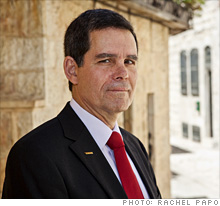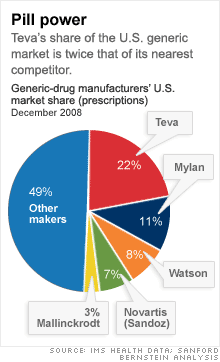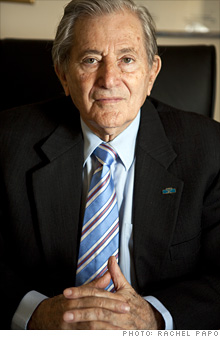Teva: The king of generic drugs
CEO Shlomo Yanai runs the world's biggest generic-drug maker. Watch out, Pfizer.
 |
| Shlomo Yanai, CEO of Teva Pharmaceutical Industries |

 |
| Eli Hurvitz, chairman of Teva, masterminded the drugmaker's fast-growth strategy |
(Fortune Magazine) -- No one knows what the CEOs of the biggest drug companies dream about, but their nightmares probably look a little like this:
Perched on a hill in Jerusalem, there is a factory that makes more than 8 billion pills a year. Its rooms contain giant metal vats of powder and tablet-making machines. Pipes run through the floors, spewing out pills that fall, like colored raindrops, into plastic crates. Workers pour them into bottles, which are slapped with unrecognizable labels. Their names don't matter: These generic drugs are inexpensive copies of blockbuster pills, and Teva Pharmaceutical Industries, the owner of the factory and 37 others like it, is swallowing Big Pharma's market share.
Israel's Teva (pronounced teh-vuh) is the world's biggest generic-drug maker. By making knockoffs faster and in bigger quantities than the competition, the company now accounts for 22% of all generic prescriptions written in the U.S. Teva's worldwide revenues are on track to grow 27% this year, to $14 billion, and investors have taken note. In the past year its stock has risen 13% at a time when the S&P 500 dropped by 25%. Locals are outspoken about their pride in Teva (TEVA); many call it "Israel's stock." A $20,000 investment in the company in 1990 would be worth $1.6 million today.
The country's interest in Teva resembles America's fascination with Apple, and local media cover CEO Shlomo Yanai's every move (think Steve Jobs). A hard-driving Israeli ex-general, Yanai, 57, last year stunned company watchers when at an investor conference he boldly announced that Teva, then a $9-billion-a-year company, would attain $20 billion in revenues and 20% profit margins by 2012. So far the drugmaker is on target to reach that goal, helped in part by its $7 billion acquisition last year of generics maker Barr of Montvale, N.J.
Over the longer term, analysts expect the company to boost profits by 14% annually for the next five years, compared with flat earnings at the five biggest pharmaceutical companies. Because of its growth potential, Teva's market capitalization has ballooned to $45 billion -- bigger than that of Bristol-Myers Squibb (BMY, Fortune 500) or Eli Lilly (LLY, Fortune 500).
Yet as the company grows, it might be hard to match its previous track record. "One of the biggest concerns on Wall Street is, When does Teva become the Pfizer of generics?" asks Ken Cacciatore, an analyst at Cowen & Co. "When does it become too big to grow?"
One challenge: Teva is reaping $2 billion a year in revenue from a drug it actually invented itself, multiple sclerosis treatment Copaxone. (Teva is the only generics maker with its own blockbuster drug.) Copaxone, however, goes off patent in 2014. The company has some new drugs in the pipeline that it hopes will fill that looming hole, but for the most part it must rely on generics for growth. Teva plans to expand internationally, especially in emerging markets, where it faces competition from Big Pharma companies that are trying to launch their own generics divisions. "Competition is much fiercer than it used to be," says Yanai. "But what we have we can enhance and enlarge."
If anyone is tough enough to face down Teva's rivals, it's Yanai. Like all Israeli citizens, Yanai joined the army at the age of 18. He originally intended to leave after the required three years, but during the 1973 Yom Kippur War he was wounded when a missile hit his tank in Egyptian territory. The sole survivor of the attack, he spent the next six months in a hospital. It was then, he says, that he decided to stay in the military.
When he was 45, Yanai became the top strategist of the Israel Defense Forces (IDF), heading Israel's security delegation to Camp David in 2000. He says the Prime Minister at the time, Ehud Barak, told him to take a sabbatical to attend Harvard Business School's advanced management program, after which he would become deputy general chief of staff. Soon after he returned from the U.S., however, Barak gave the job to someone else, and Yanai quit the army. Lacking business experience, he nonetheless persuaded the chairman of agrochemical company Makhteshim Agan to appoint him CEO in 2003.
"I first decided to join the business sector. Then I made a decision that I'd like to take an executive role," says Yanai nonchalantly. Teva chairman Eli Hurvitz, who's considered by many to be the Bill Gates of Israel for his success in building wealth for his shareholders, was impressed by Yanai's knack for strategic thinking and hired him as CEO in 2006 despite the fact that the general had no industry experience. "So he's not in pharmaceuticals, not very experienced -- so what?" Hurvitz says. "I saw that he was clever, and I put an eye on him."
With dark, flashing eyes, Yanai looks intimidating even when wearing an ill-fitting lab coat and protective booties over his shoes. His hands are scarred from injuries incurred during battle. As he strides through Teva's Jerusalem factory, he names the different Tic Tac-like pills falling into open containers. The key to Teva's success? It started selling many of these generic drugs even before the originals' patents had expired.
How can the company do that? In 1984, Congress passed the Hatch-Waxman Act, which says that generic-drug makers can start producing copies of a drug if they prove its patent is unenforceable. They would also get six months of sales exclusivity. In 2004, Teva filed an application to produce a copy of Novartis's blockbuster blood pressure medicine Lotrel, even though the drug's U.S. patent didn't expire until 2017. Teva argued that Lotrel's patent was "obvious" -- in other words, elements of the recipe for Lotrel were already in the public domain -- and that its own version wouldn't infringe. A district court agreed, and Teva launched its own version in 2007, bringing in an estimated $330 million in revenue in six months.
Big Pharma isn't happy about the way Teva operates. "A comparable situation [to generic drugs] would be you building a house and putting a lock on the door and then after a period of time, anyone who can pick the lock can legally use your house," wrote Martin Voet, formerly a lawyer at Allergan (AGN), which makes Botox, in his 2005 book, The Generic Challenge. Some Big Pharma executives allege that because generic drugs cut into their exclusivity periods and profits, they impede their ability to invent new products. Yanai doesn't buy it. "There's no relation between length of patent and innovation," he says.
Over the next three years some $89 billion worth of drugs will lose patent exclusivity, according to research firm IMS Health. Teva is waiting with open arms. Its 135 lawyers constantly scour patents looking for weaknesses, and the company currently has 197 applications out to the FDA to produce copies of drugs; Teva is challenging the patents of more than half of them. Its knockoffs will take a price cut of anywhere from 5% to 60%.
Teva is also targeting a sector of the pharmaceutical industry that has yet to spawn copycats in the U.S.: biologics, which are protein-based therapies that treat diseases such as cancer and are worth some $60 billion a year. Although biologics are notoriously difficult to copy, generic-drug makers like Teva are eager to produce "biogeneric" versions of drugs like Abbott's Humira, which treats arthritis. Unlike with traditional drugs, there is no legal way in the U.S. to sell generic copies of biologics, although the Senate is working on the issue. Teva isn't waiting idly: The company already sells them in Europe and is ramping up production capacities. "The good news for us is that, because [biogenerics] require high-cost investments, we're only going to see a few competitors," says Dr. Ben-Zion Weiner, Teva's R&D chief.
Those competitors have come out swinging. Swiss drug giant Novartis (NVS) recently won the rights to sell a biogeneric version of Pfizer's Genotropin, a human growth hormone, in Japan, and Merck (MRK, Fortune 500) announced plans to develop biogenerics through a division called BioVentures. "Teva is going to be competing with the big boys," says Sanford Bernstein analyst Ronny Gal.
Big Pharma also has its sights on the heart of Teva's business: the traditional generic market. After decades of calling companies like Teva second-class citizens, branded-drug makers want to join the race. Pfizer (PFE, Fortune 500) said recently that it would expand its portfolio of generics. GlaxoSmithKline (GSK) in June announced a partnership with Indian generic company Dr. Reddy's (RDY) to sell cheap drugs in emerging markets.
Yanai says branded-drug makers have tried to do this before and ended up selling their generics divisions. He isn't convinced that they can thrive in an industry with lean margins and cutthroat legal tactics. "With all due respect, you can't take a Persian cat and educate it to become a street cat," he says. "It's not just about making generic drugs -- you need to be lean and agile. And if one day someone tells you to get off the stove, get rid of your fat, go to the streets ..." He trails off. "You can imagine the likelihood of success."
Yanai has a lot of chutzpah -- but he could be right. After Pfizer announced its plan to go generic, Goldman Sachs analyst Jami Rubin had a question for the drugmaker: "Are you trying to be another Teva?" ![]()
-
 The retail giant tops the Fortune 500 for the second year in a row. Who else made the list? More
The retail giant tops the Fortune 500 for the second year in a row. Who else made the list? More -
 This group of companies is all about social networking to connect with their customers. More
This group of companies is all about social networking to connect with their customers. More -
 The fight over the cholesterol medication is keeping a generic version from hitting the market. More
The fight over the cholesterol medication is keeping a generic version from hitting the market. More -
 Bin Laden may be dead, but the terrorist group he led doesn't need his money. More
Bin Laden may be dead, but the terrorist group he led doesn't need his money. More -
 U.S. real estate might be a mess, but in other parts of the world, home prices are jumping. More
U.S. real estate might be a mess, but in other parts of the world, home prices are jumping. More -
 Libya's output is a fraction of global production, but it's crucial to the nation's economy. More
Libya's output is a fraction of global production, but it's crucial to the nation's economy. More -
 Once rates start to rise, things could get ugly fast for our neighbors to the north. More
Once rates start to rise, things could get ugly fast for our neighbors to the north. More







